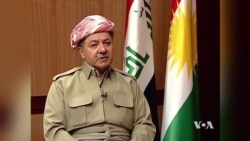The president of Iraq’s Kurdistan Regional Government has told VOA the situation in the country has increased the urgency of creating an independent Kurdish state.
Peshmerga fighters from the Kurdish autonomous region have responded to territorial gains by Sunni militants with moves of their own, taking the disputed city of Kirkuk, and surrounding areas.
Now, Iraqi Kurdistan regional President Massoud Barzani told VOA this was the time to create a Kurdish state.
“This is a natural right that must be achieved. Independence must be achieved. I believe now the conditions are also favorable for independence,” he said.
The United States continues to oppose Kurdish independence. "No change of policy here. We've said that a unified Iraq is the strongest Iraq," said State Department spokeswoman Marie Harf.
But Kurdish leaders have a strategy designed to make independence palatable to the United States.
Speaking via Skype, Bill Park of London’s King’s College said, "They want to present themselves as not so much declaring independence from a functioning, ongoing Iraqi state, but being forced into independence as a consequence of the chaos around them."
That was clear in Barzani’s interview with VOA's Persian Service.
“The situation is chaotic and scary. Now along a 1,050-kilometer border we face terrorists and radical groups and people who are unknown to us. This is a new situation. I doubt if Iraq will go back to what it was,” he said.
And Barzani said the past strong opposition to Kurdish independence was no more.
“We have discussed this with the United States, with all sides, and with the Europeans. In the past, reaction was severe, but we don’t see that anymore,” he said.
Bill Park said still, Barzani had to be careful not to alienate his old friends in Washington, new friends in Turkey and Iran, and even some of his own people.
“It is a kind of high risk strategy, but it’s a lot less risky now than it’s ever been in the past,” he said.
Indeed, many experts believe that, whatever happens in Kurdistan, Iraq will never be as it was before the Sunni militants took over large areas in the west and center of the country.
American political consultant Sam Patten has advised Iraqi Kurds and moderate Sunnis and spoke to Alhurra television.
“The relationship that existed until now between Baghdad and the regions will never be the same," he said. "The regions that are no longer under Baghdad’s control are going to have to enjoy some degree of autonomy that they haven’t seen before,” said Patten.
The militant Sunni fighters now call themselves the Islamic State. Whether they can make that stick remains to be seen, but they may have created the opportunity for Kurds to fulfill their long held dream of statehood, and placed the future of the Iraqi state in question.





